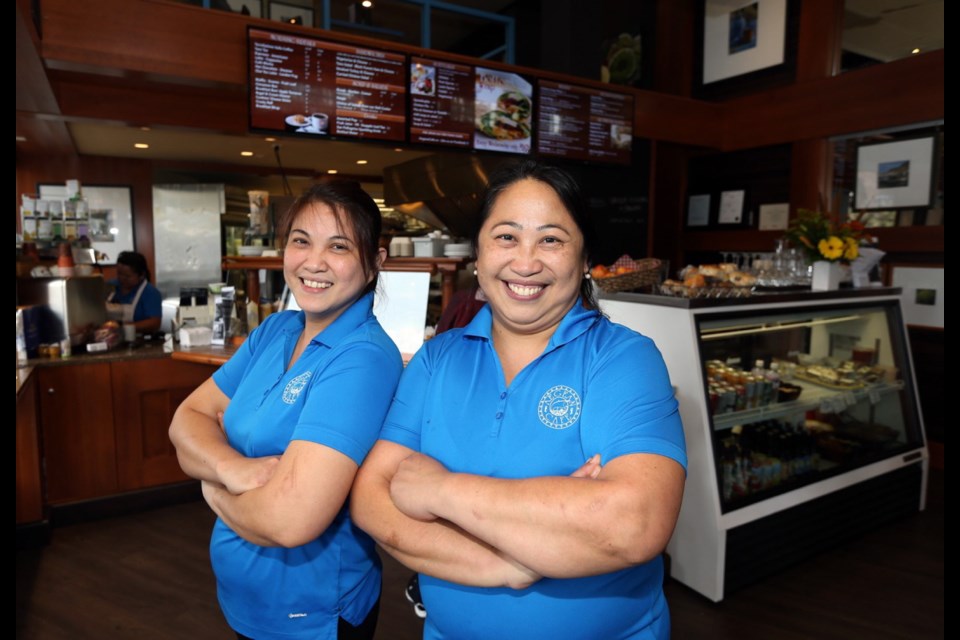Tess Hrominchuk started building her business career at age 10 when she was entrusted with the money to buy goods for her family’s convenience store in the Philippines.
Today, Hrominchuk is celebrating 16 years of operating the Aegean Cafe, now in a new renovated location at the corner of Fort and Blanshard streets.
This is Small Business Week in B.C., where 382,200 businesses fall into that category. A small business is defined as having 50 or fewer employees. These small businesses make up 98 per cent of all businesses in the province, states the B.C.-Canada Small Business Profile 2014 report.
The accommodation and food sector — including hotels and restaurants — accounts for four per cent of small firms with 0 to 49 employees, the report said.
Although restaurants are considered a high-risk business — about 70 per cent fail within their first year, the B.C. Restaurant and Foodservices Association reports — that doesn’t stop would-be restaurateurs. Every year, between 500 and 600 start up.
At the Aegean Cafe, the aroma of baking hangs in the air as Hrominchuk, partnering with sister Anna Dupitas, smiles and chats with customers.
To make the seven-day-a-week restaurant successful, Hrominchuk spends about 60 hours a week on the job. That includes customer service, working in the kitchen, doing the bookkeeping and payroll, and general cleaning, such as scrubbing baseboards. “We do everything.”
Her mother always worked hard. “Self-employment has always been in my blood.”
Hrominchuk, 49, arrived in Canada to work as a nanny. She moved into the restaurant industry and eventually into management. The public library was her cooking teacher — she borrowed books and practised at home.
“It was out of necessity.” There was no YouTube 20 years ago with how-to demonstrations, she said. On Monday morning, one customer described her breakfast as “perfect.”
The Aegean, which moved only about 150 metres east on Fort Street to its new, more prominent location, was already established as a Greek restaurant when Hrominchuk bought it. While Greek cuisine is still a large part of the menu, Hrominchuk added breakfast after the move.
Moving has taken the Aegean into an area with plenty of other restaurants, something Hrominchuk considers a bonus.
Varsha, owned by the Dodd family and a silent partner, is a newcomer to Victoria’s restaurant scene. At 1600 Government St., it is in the same location as their previous Nando’s, which closed in spring. That restaurant did not perform as desired, said manager Arun Dodd, 33. The partnerships’ Langford Nando’s remains open.
After major renovations, Varsha, named after Arun’s mother, opened in June with 12 staff. Family photographs on the wall show Varsha and husband Komal, their boys Arun and Karn, and other relatives. The goal is to create an atmosphere where customers feel at home, said Arun, 33.
Varsha brings more than a name to the restaurant. “She does most of the cooking. She loves it,” Arun said. “The recipes are all hers.”
Arun studied restaurant and hotel management and has worked in several restaurants. He’s on the job seven days a week and loves interacting with customers. “This is what I want to do. I enjoy cooking.”
Varsha specializes in what Arun calls Indian-fusion. The aim is to offer Indian meals along with Western food so that everyone can find something they enjoy, he said. One fusion item is among the restaurant’s most popular choices — butter chicken poutine. The menu includes a wide range of cocktails and non-alcoholic mixed drinks.
Victoria’s downtown restaurant scene has been further bolstered by the arrival of popular Vancouver-based Meat and Bread, which recently opened at 721 Yates St. And Tacofino, another eatery with a devoted following used to lining up at its food trucks, now has a restaurant at 787 Fort St.
Ian Tostenson, president and chief executive officer of the B.C. Restaurant Association, said the industry is rebounding after the 2008 recession, which saw the number of restaurants drop to 11,500 from 12,000.
“We are starting to see a slight net increase in restaurants since the economy has improved,” he said.
Sales have also increased by about seven to 10 per cent, he said. “More people are going out more often.”
An owner must have a good concept, be able to control labour and food costs, be a savvy marketer, understand legal matters such as negotiating leases, deal with government regulations, be a human- resources manager and understand service. Finding good staff and coping with rising food prices are also on the table, he said.
“It is highly disciplined,” Tostenson said. “It takes very hard work and it [requires] a lot of creativity and innovation.”



